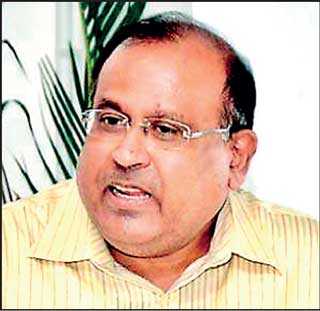Tuesday Feb 24, 2026
Tuesday Feb 24, 2026
Wednesday, 3 February 2021 00:00 - - {{hitsCtrl.values.hits}}
By Uditha Jayasinghe
 |
| Joint Apparel Association Forum Chairman A. Sukumaran |
The apparel sector contracted 23% last year with earnings dropping to $ 4.1 billion from $ 5.3 billion in 2019, a top official said yesterday, warning that unless the Government assists in providing COVID-19
vaccinations to its 350,000 strong workforce within the next three months, the industry could face deeper challenges in 2021.
Joint Apparel Association Forum (JAAF) Chairman A. Sukumaran, speaking at an online event titled “Recovery of Sri Lanka’s Apparel Sector from the COVID-19 crisis” organised by the Institute of Policy Studies (IPS), appealed to the Government to prioritise importing COVID-19 vaccines to support not just the apparel industry but all exporters. He pointed out it was essential for all export companies to prioritise immunising their employees as they were integral to the wellbeing of the country’s economy.
Sukumaran emphasised that the industry was prepared to fund vaccinations for all its employees and was hopeful of completing the process by April or May. He warned that Sri Lanka was facing stiff competition from other countries who had been able to meet orders, despite having higher COVID-19 patient numbers.
“JAAF has already started discussions on this with the Government. What policymakers need to understand about the apparel industry is we accept orders four months in advance, and if we cannot deliver the orders promised then clients are going to lose faith in us,” he warned. “Already we have been warned by the largest buyer that unless Sri Lanka gets its act together, they will look elsewhere. .
Sri Lanka’s apparel industry has always maintained a reputation for reliability but due to COVID-19 we are in danger of losing that.”
The apparel industry was hit in three crucial ways last year, Sukumaran explained. Initially it was lack of raw material and other supplies as COVID-19 rampaged through China in early 2020, and later, as the pandemic spread rapidly to crucial markets, the lockdowns in the UK and Europe resulted in fewer buyers. A third layer of impact was added when Sri Lanka’s second wave triggered a partial lockdown and more stringent health guidelines for factory operators.
“The health guidelines are necessary, we as an industry understand that and we have done our best to implement them and keep our workers safe. But the outcomes have been challenging. Board of Investment (BoI) companies have spent about Rs. 1 billion on PCR tests alone, which we cannot afford to do. The additional costs involved are also making our margins tighter and we are also under pressure to meet deadlines and not lose out to competitors. Taking all these aspects into consideration the industry is convinced that the best way forward is to prioritise the rollout of vaccines to all 350,000 workers.”
Sukumaran went onto say Government support was critical as no other stakeholder can place orders to import the vaccine. He pointed out that if Sri Lanka can move forward quickly to vaccinate its manufacturing workers then both the respective industries, as well as the economy, would benefit.
Lesova Holdings Director Malith Jayasinghe participating at the event echoed the JAAF Chairman and stressed that smaller apparel companies as well as the overall Small and Medium Enterprises (SME) sector stood to benefit if the Government focuses on providing them with vaccines in the next few months.
“SMEs make up over 52% of Sri Lanka’s economy and a large part of its workforce. These companies must be supported to keep their businesses open,” said Jayasinghe. “Assistance given to prioritise vaccinations and increasing access to working capital relief are two ways the Government can bolster this important segment at this time.”